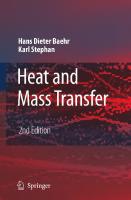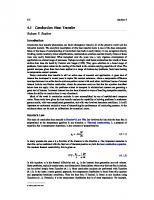Incropera's Principle of Heat and Mass Transfer [Solutions] [8 ed.] 1119660378, 9781119660378
There are two WileyPLUS platforms for this title, so please note that you should purchase this version if you course cod
1,400 140 46MB
English Pages 1072 [2088] Year 2019
Recommend Papers
![Incropera's Principle of Heat and Mass Transfer [Solutions] [8 ed.]
1119660378, 9781119660378](https://ebin.pub/img/200x200/incroperas-principle-of-heat-and-mass-transfer-solutions-8nbsped-1119660378-9781119660378.jpg)
- Author / Uploaded
- Frank P. Incropera
- Theodore L. Bergman
- Adrienne S. Lavine
- David P. DeWitt
File loading please wait...
Citation preview
PROBLEM 1.1 KNOWN: Temperature distribution in wall of Example 1.1. FIND: Heat fluxes and heat rates at x = 0 and x = L. SCHEMATIC:
ASSUMPTIONS: (1) One-dimensional conduction through the wall, (2) constant thermal conductivity, (3) no internal thermal energy generation within the wall. PROPERTIES: Thermal conductivity of wall (given): k = 1.7 W/m·K. ANALYSIS: The heat flux in the wall is by conduction and is described by Fourier’s law,
q′′x = −k
dT dx
(1)
Since the temperature distribution is T(x) = a + bx, the temperature gradient is
dT =b dx
(2)
Hence, the heat flux is constant throughout the wall, and is
q′′x =−k
dT =−kb =−1.7 W/m ⋅ K × ( −1000 K/m ) =1700 W/m 2 dx
0.1 Hence, the lumped capacitance method is inappropriate. Using the one-term series approximation, Eqs. 5.52 with Table 5.1, θ* = C1 exp −ζ12 Fo J o ζ1r* r* = r ro = 1
(
T ( ro , t ) − T∞ = θ* = Ti − T∞
= Bi hr = o k 1.84
) ( )
− 350 ) C (175 = ( 25 − 350 ) C
0.54
= ζ1 1.546 rad
= C1 1.318
Continued...
PROBLEM 7.52 (Cont.) 0.54 = 1.318exp[-(1.546rad)2Fo]J o (1.546 × 1) Using Table B.4 to evaluate J o (1.546) = 0.4859, find Fo = 0.0725 where
= Fo
5.68 ×10−7 m 2 s × t o = = 5.68 ×10−3 t o 2 2 ro ( 0.010 m )
α to
(6)
3.06. Therefore, we specify N = 4.

![Heat and Mass Transfer [4]
0256114439, 9780256114430](https://ebin.pub/img/200x200/heat-and-mass-transfer-4-0256114439-9780256114430.jpg)

![Fundamental of Heat and Mass Transfer [7 ed.]](https://ebin.pub/img/200x200/fundamental-of-heat-and-mass-transfer-7nbsped.jpg)

![Heat and Mass Transfer [2, 2020 Ed.]
9789811539879, 9789811539886](https://ebin.pub/img/200x200/heat-and-mass-transfer-2-2020-ed-9789811539879-9789811539886.jpg)
![Heat and Mass Transfer [7 ed.]
9789352533848](https://ebin.pub/img/200x200/heat-and-mass-transfer-7nbsped-9789352533848.jpg)
![Heat and Mass Transfer [5 ed.]
8285444382](https://ebin.pub/img/200x200/heat-and-mass-transfer-5nbsped-8285444382.jpg)
![A Heat Transfer Textbook, Solutions Manual [5 ed.]](https://ebin.pub/img/200x200/a-heat-transfer-textbook-solutions-manual-5nbsped.jpg)
![Fundamentals of heat and mass transfer [6th ed]
9780471457282, 0471457280, 9780471761150, 047176115X](https://ebin.pub/img/200x200/fundamentals-of-heat-and-mass-transfer-6th-ed-9780471457282-0471457280-9780471761150-047176115x.jpg)